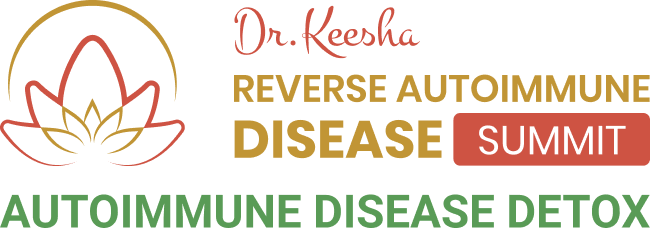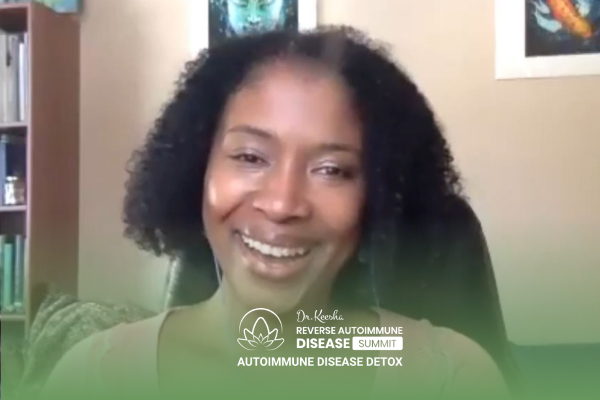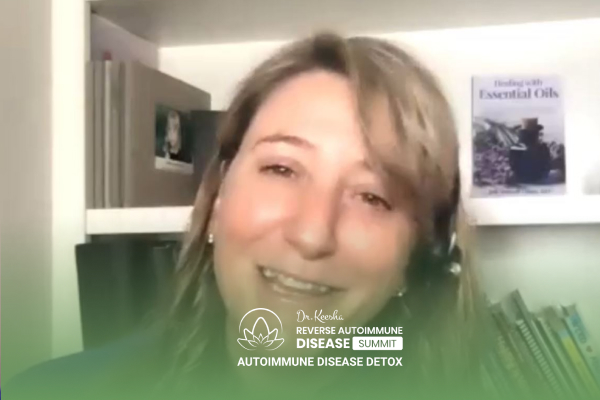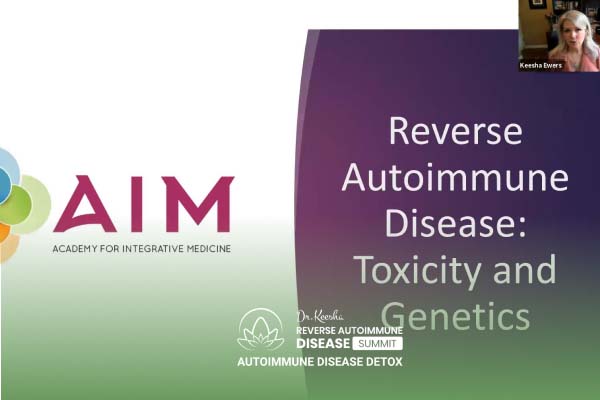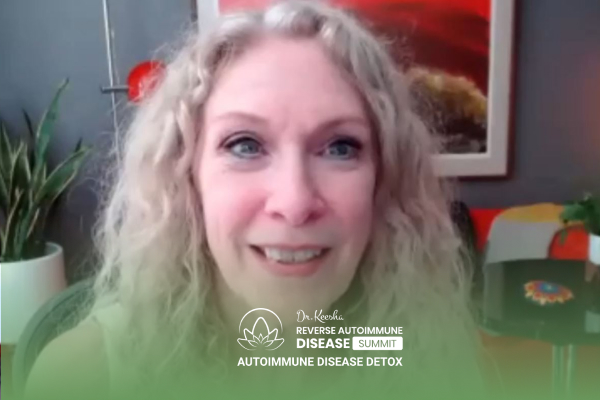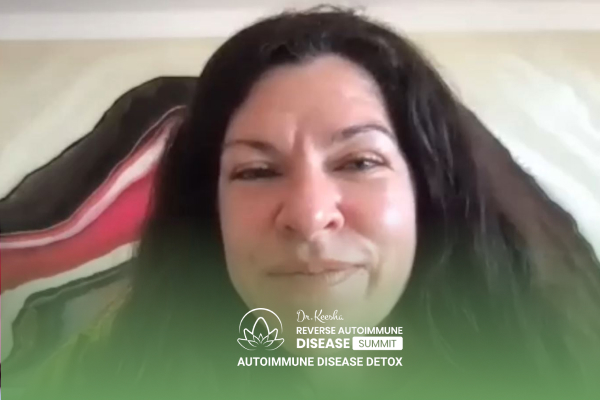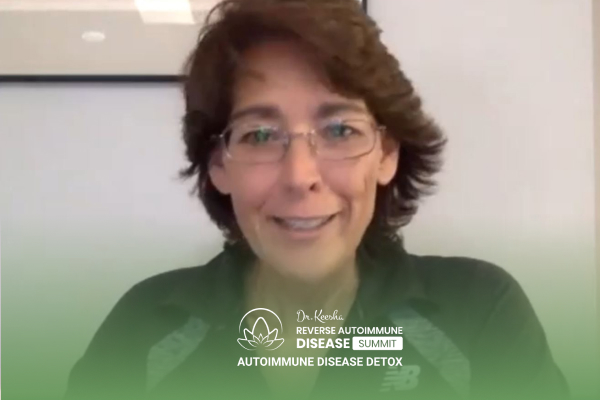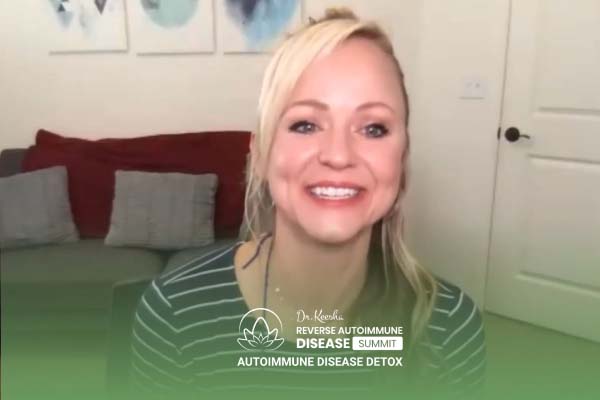Join the discussion below
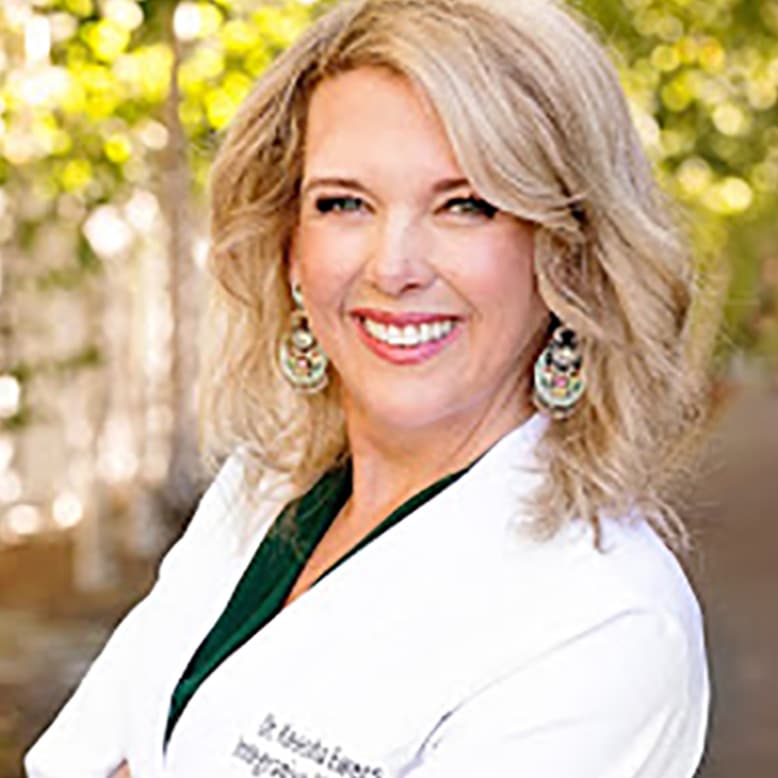
Keesha Ewers, PhD, ARNP-FNP-C, AAP, IFM-C
Dr. Keesha Ewers is an integrative medicine expert, Doctor of Sexology, Family Practice ARNP, Psychotherapist, herbalist, is board certified in functional medicine and Ayurvedic medicine, and is the founder and medical director of the Academy for Integrative Medicine Health Coach Certification Program. Dr. Keesha has been in the medical field... Read More

Dr. Kyia is a board certified ob/gyn, author and functional medicine expert who is committed to integrating the physical, mental, emotional, and spiritual components of health. After complete burnout following her training, and almost retiring from medicine because she was tired of treating “symptoms” and never getting true healing for... Read More
Dr. Kyia Nichols integrates the physical, mental, emotional, and spiritual components of health.
- How pregnancy can push the body over the edge into autoimmunity
- What to learn from the “boiling frog” analogy about symptoms and overwhelm
- How to avoid burnout by listening to your body
Keesha Ewers, PhD, ARNP-FNP-C, AAP, IFM-C
Welcome back to the Reverse Autoimmune Disease Summit. This is the fourth iteration. It’s RAD Summit 4.0 everybody. I’m Dr. Keesha, we’re in the Autoimmune Detox Summit this time and delighted to bring you Dr. Kyia. Who’s board certified OBGYN, author and functional medicine expert, who is committed to integrating the physical, mental, emotional and spiritual components of health for her clients. After complete burnout following her training and almost retiring from medicine, because she was tired of treating symptoms and never getting true healing for her clients. She started exploring other healing methods. She was determined to find tools for herself and her patients, that would heal disease, rather than putting a bandaid over it. She clearly recognized the gaps within the traditional medicine modality and began exploring ways to treat the entire person, taking into consideration the emotional and spiritual aspects of health. She came to realize that the missing piece of the puzzle involved identifying root causes of disease, not just on a physical level, but also the emotional and spiritual levels. Unless this is holistically addressed, issues simply re-manifest, never resolve and get worse. Her mission is to assist people to remember who they really are, which is much more than our physical bodies. As we heal all aspects of ourselves, our bodies and lives come into balance and flow more harmoniously. Which is why you’re here on this summit, Dr. Kyia.
Kyia Nichols M.D.
Thank you so much. It’s great to be here. Chatting with everyone.
Keesha Ewers, PhD, ARNP-FNP-C, AAP, IFM-C
Yeah, this is, I don’t know another medical provider in this space, who doesn’t have their own story about how they got here. And in your bio, you know, of course we said a little bit about it, but that burnout, right?
Kyia Nichols M.D.
Oh yeah.
Keesha Ewers, PhD, ARNP-FNP-C, AAP, IFM-C
It’s real and it doesn’t just happen in medical school, it happens in life, in general, where people just feel like they can’t pick themselves up off the floor anymore. And they find out that the meanings and the beliefs that they have, about what makes them worthwhile are shattering around them, right.
Kyia Nichols M.D.
Absolutely.
Keesha Ewers, PhD, ARNP-FNP-C, AAP, IFM-C
Yeah.
Kyia Nichols M.D.
And I think, yeah, oh, go ahead.
Keesha Ewers, PhD, ARNP-FNP-C, AAP, IFM-C
Yeah and I, you know, for people with auto immune disease, I always say there are some Ps involved with everybody with auto-immunity and perfection is one of them and people pleasing is another. And those two, you know, those ways of getting what you need from the world, they become untenable. And when they shatter around us, there’s usually some big crisis that’s just happened where you finally discover this is not working, right.
Kyia Nichols M.D.
Exactly and I think, you know, it’s interesting that you say with the Ps, I definitely had the perfectionism one. And I think about even with, you know, when we think about autoimmunity and there potentially is a certain rigidity, as well in the body and, you know from my own journey, I think and with a lot of people who are suffering from autoimmunity, we were in this pattern of living, that it continues to escalate. So, its interesting in practice. A lot of my patients, you know, when I said, or would ask like, when did this begin, or when was it that you said, oh, I absolutely have to get help. And most people, like you said, there is a crisis. There is that one thing that usually happens, the body is very resilient. So over time, it’s trying to adjust to changes and to the stressors. And then there’s usually that one thing, that kind of pushes it over the edge. And I think a lot of people, I mean, with pregnancy is a big one. Anything that taxes the immune system in general-
Keesha Ewers, PhD, ARNP-FNP-C, AAP, IFM-C
Lets go back to pregnancy, because I don’t think there’s sort of fine print in the contract about conceiving and bearing children, that none of us see. We kind of keep our mind on the prize, right? Like, oh, I wanna have children. And what we don’t realize. I mean, I have four of them and I don’t, I would never do it differently, than what I did. But what I didn’t see, in the fine print was just what a toll that takes on the female body, to
conceive, bear, birth and keep a child alive, especially in that first year. Wow!
Kyia Nichols M.D.
Yup. Absolutely, yeah. And the thing is, if you know, a lot of people who are getting into pregnancy, are not starting out with a hundred percent healthy body and pregnancy in itself, is putting the entire body in an auto-immune state, to support this pregnancy. That looks a little bit different than itself. So, it’s not going to attack the baby. And anything that is underlying during pregnancy, will rear its ugly head, because we have now put our bodies into this. It’s a state, where anything and everything can potentially flare up and pregnancy is, it’s one of those really big triggers.
So, if you have been petering along, sort of, you know whether it’s eating the incorrect foods, all of the beliefs and emotions and traumas and things from the past, all of that is stacking up. Then pregnancy can be like, it can be the switch. And sometimes, you know, it’s a blessing in a way too, when we have these big life events, that cause us to kind of take another look at, okay, what’s going on here, what’s going on with my body and what is going on with life. Unfortunately, you know, on the flip side with pregnancy, this can come at a time when the body is worn out. It potentially is not being completely supported. And then on top of that, you’re not completely able to recover right after pregnancy, because you’re going into this, now space of insomnia and hormonal changes. So it can be a pretty crazy storm of events, but it sometimes it’s a blessing for us women, to be able to step back and say, okay, something needs to change here.
Keesha Ewers, PhD, ARNP-FNP-C, AAP, IFM-C
I thought about it in this really interesting way several months ago, I have a big bathtub and I get the water to- I don’t have a lot of patience, for waiting for it to fill all the way up. And so I’ll get to the water to the degree that I want it to and then I’ll climb in and I’ll just read a book while it’s continuing to fill. And I usually have to make it hotter and hotter and hotter as I’m in there getting used to it. Right and whereas, if I were to just get in it would be way too hot. And so I’m the boiling frog, you know, it gets hotter and hotter and hotter. And then one evening my husband got in with me and I already had it to the place where I always like it.
Right and it had cooled for awhile, so he could just get right in and he got right in and then it threatened to overfill the bathtub. And I thought about that. And I thought, this is like pregnancy. You have everything that your body is adjusting as you go, it’s slowly happening. And it’s making its little adjustments. And then another little bean gets in and it’s like swamp. Right and you don’t even realize how hot it’s gotten and you know, and you’ve just gotten accustomed to it. And so, like you said, it’s not a bad thing, because every single time the body gives some feedback, that’s what it is. It’s just data, right. Elevated TPO, you know, around your thyroid. That happens a lot in pregnancy. Right, where people, all of a sudden have Hashimoto’s . And it’s not all of a sudden, or after birth. Right, all of a sudden they have an auto-immune disease, that they never had before. And yet, it’s been latent all those years.
Kyia Nichols M.D.
Absolutely.
Keesha Ewers, PhD, ARNP-FNP-C, AAP, IFM-C
Another little bean got into the tub with you.
Kyia Nichols M.D.
Yep, absolutely. Absolutely. And I think this is one of the things that you said is important too, is we peter along like this, or whether we’re the frog, it’s, you know things are heating up and we are, because we’re so resilient but like, just as human beings, we can be going along and stressors, you know, work is getting more and more stressful and we’re adapting to it. Or so we think, but we aren’t slowing down to really say okay, something needs to change. Like we go along feeling like this is life. This is how it’s going to be. And not necessarily taking the time, or the commitment to make the changes required to prevent it from getting to that flipping point. And there are a lot of people, I know there are a lot of people watching this who have been diagnosed with an autoimmune disease, or a lot of people who are heading that way, if, you know, if they don’t start making the changes required. So they don’t have to get to that, that flipping the switch moment, or that life event that really crashes, you know, the body down.
Keesha Ewers, PhD, ARNP-FNP-C, AAP, IFM-C
Straw that breaks the camel’s back, so to speak. Yeah, so I invited you on, because I really wanted to talk about how hormones can become a source of toxicity. And you know, we often, most of our viewers are very, very, very, very smart well-read. They have a lot of experience with their auto-immunity, they’ve been listening to these summits for a long time. And so the word estrogen-dominance is not really new to them, but for those that are just maybe new into the space and have never heard that, I’d love to talk a little bit about that. And the impact that our environment, our air, our soil, our water, you know, all these estrogen disrupting and reproducing chemicals that we are exposed to. Because 80% of autoimmune diseases are diagnosed in women, 80%. And there’s often the question asked in the literature. Well why, then one of the things that comes up, is we have more estrogen receptors.
Kyia Nichols M.D.
Yeah, so I think that is that’s part of it, for sure. And there are probably even in men, some of their hormones are likely protective, in some, like even with testosterone, it’s doing different things in the body. But again, this is like, I think it’s we as women, it’s simple, but not always easy to be mindful about what’s going into our bodies. So any time there is a disruption within the body, with anything, it’s based on something we’re putting into it, whether it’s through our mouths or whether it’s beliefs and emotions. So even looking at it’s kind of- ah go ahead!
Keesha Ewers, PhD, ARNP-FNP-C, AAP, IFM-C
And on our skin and our hair and our nails.
Kyia Nichols M.D.
Yes, yes.
Keesha Ewers, PhD, ARNP-FNP-C, AAP, IFM-C
You know, it’s said that a woman can walk out of her house in the morning and have over a hundred different estrogen-disrupting chemicals that she has slathered on, that is now, she’s eating as it goes –
Kyia Nichols M.D.
Yes.
Keesha Ewers, PhD, ARNP-FNP-C, AAP, IFM-C
Yes.
Kyia Nichols M.D.
And you know., this, it first came out regarding lipstick, you know and how much estrogen-disruptors we get through that. But I remember, you know, this is kind of poignant for me, because a lot of women who had come into practice and we would break down, not just looking at estrogen dominance, but at the different metabolites of estrogen and women who were estrogen dominant, they weren’t on estrogen. And it’s like, why is this so high? And we’re searching for all of the reasons why and you know, a lot of women just cosmetics, you know, plastics as well, you know, we’re becoming educated, a little bit more educated about the things that are going into the products that we buy, that potentially disrupt estrogen. But I think we just, we have to have our like, our alert kind of up for anything. I think that we see, that comes in a box, or a bag or a jar and really making sure that we’re going organic. And then remembering that we can mitigate a lot of this, by just cleansing our bodies out. Our bodies are meant and know how to metabolize and remove things, if we’re putting the right nutrients and supplements and foods in as well.
Keesha Ewers, PhD, ARNP-FNP-C, AAP, IFM-C
So the estrogen metabolite piece is really important, because a lotta people don’t know what that is. And so they can figure out, like estrogen-dominance actually means that you have more estrogen in your ratio than progesterone. And I’m seeing a lot of men with estrogen dominance. I’m sending men in for DEXA scans now and I’m finding men with osteoporosis. It’s always been a women’s health issue. Right, you send women in for bone density scans. When I started seeing all of the estrogen-dominance and testosterone reduction, I was seeing in these men with big bellies and man boobs and you know, just really this is a formula for prostate cancer and testicular cancer. Right, I thought, well, there’s that, but then also, what about the other things that women, we watch in them, you know, when this is happening I’ve been diagnosing osteoporosis in men.
Kyia Nichols M.D.
Well and I think that issue actually, because when we’re looking at hormones so I never look at hormones just in a vacuum, we really have to look at the whole HPA axis.
Keesha Ewers, PhD, ARNP-FNP-C, AAP, IFM-C
Right.
Kyia Nichols M.D.
So and breaking down the metabolites, you know going again, if you’re seeing a practitioner like yourself, or me, who is able to actually do that, in mostly in the urine and get those metabolites, you can geek out and get into minutiae on what each of the metabolites do. But in general, you have to also look at the whole HPA axis. So even like when you’re speaking of-
Keesha Ewers, PhD, ARNP-FNP-C, AAP, IFM-C
We’ll define that, because you and I are speaking in jargon right now, so we’re talking about the hypothalamus pituitary adrenal axis, when we’re talking about this and what Dr. Kyia is referring to, is the fact that if you perceive yourself as stressed out, then you’re going to be sending a signal, you know, from your mind and brain, down to your lovely little adrenals to then let go of cortisol. So you can fight, or you can flee, or you can freeze right. Or faint. And so if you do that in perpetuity, then you’re going to wear out your thyroid and your gonads because every, your body’s always trying to maintain melons and it will start to hijack, right. Borrow, rob Peter to pay Paul,
Kyia Nichols M.D.
Yes.
Keesha Ewers, PhD, ARNP-FNP-C, AAP, IFM-C
Finally, it’s empty. And then you notice the symptom. And so that’s really important. So when we talk about HPA axis, that’s what we’re talking about. And, you know, it’s a big root cause of why we get into trouble with our estrogen, testosterone, progesterone.
Kyia Nichols M.D.
Yeah and you know and particularly looking at cortisol or anytime that we are in the fight or flight state, which most people are 24 hours of the day, or 20 hours of the day or so, you’re also putting your body. So when I, you know, just thinking about the osteoporosis there and looking at, you know, when you’re, when I see that sometimes and especially in men, it almost looks like people who are on chronic steroids for like transplants, for like transplants and things like that. It’s that big of an issue. And when we think about that fight or flight response and the stress response which is only supposed to be triggered in 20 minute time periods, you know, it’s the pro-inflammatory state and it’s also, it wears and breaks down the tissues and the bones and everything over time.
So it’s partly absolutely the hormones. And it’s like you said, you’re exhausting when you’re in fight or flight, you’re not actually using your progesterone, you’re stealing your progesterone to supply that cortisol. And your testosterone is being converted into estrogen for men, as well as thinking that the metabolites of estrogen, or what we call the bad estrogen. It’s actually really, a body never sabotages us in any way. And it’s like, why would your body actually shuttle your good juicy hormones, into this pro-inflammatory state? And it really can’t do anything but that, so we can either be in fight or flight, or it can be in rest and digest. And when we’re in that fight or flight state, it literally can not use those hormones. Even if we have normal amounts of the hormones that we want in place, the what we call the good hormones, or the good metabolites, your body can’t, it can’t even use them. It’s like it’s in a holding pattern.
So even when I say, you know, the estrogen metabolites, or the like the bad estrogens, it’s really, it’s almost it’s the body’s way of doing whatever it can, to have it in a holding pattern while it is focused on keeping you alive for some reason in our minds, ’cause that’s what the stress is. Most of the time we are not running from a lion, on a day-to-day basis, it’s our jobs and work and the foods and things that we’re putting into our mouths, our environments, that all of the toxins. So I feel like it’s anytime we’re having an issue with the hormones, with anything, it’s the perfect opportunity when we’re having a symptom to figure out why, why is the body doing this? Why is it taking my good hormones and shuttling it into a pro-inflammatory state? Why is it doing that? And that really is what takes the deeper dive through your labs, through working with a practitioner, through your detox, through the mindfulness, whatever you can to go deeper to release traumas. And when you get to that point, everything then opens up.
And you know, I say this a little bit because I think sometimes with all of the potential reasons and things that disrupt our bodies, sometimes it can seem like a difficult task to try to, you know, go through your house and identify every single thing that’s potentially creating a problem. And that is important. It’s important to do that, but to know that it is possible to heal and reverse. When you do become mindful, you take the deeper dive and you figure out why your body is doing this. It’s not sabotaging you on purpose, basically.
Keesha Ewers, PhD, ARNP-FNP-C, AAP, IFM-C
It’s always trying to do what it can to keep you alive. And, you know, that’s a big piece of it. And I’m finding a lot of people for really interesting reasons, I do genetic testing on a hundred percent of my patients, because of a couple of reasons. And one of them is I’m finding a lot of non-alcoholic fatty liver disease.
Kyia Nichols M.D.
Oh yeah.
Keesha Ewers, PhD, ARNP-FNP-C, AAP, IFM-C
And if you have fatty liver, your body’s not going to be able to rid itself of those harmful estrogen metabolites. Right and you’re also more likely to become insulin resistant. And you’re also, you know, like the liver is such an important filtration.
Kyia Nichols M.D.
Absolutely.
Keesha Ewers, PhD, ARNP-FNP-C, AAP, IFM-C
So if it’s congested, this is problematic. And I started asking the question of why am I seeing so much of this recently? You know, and I have come to the conclusion and it’s there are a few things, but one of them is an increase in the keto diet, where people that are-
Kyia Nichols M.D.
I agree. With like the keto, Atkins type keto, yeah-
Keesha Ewers, PhD, ARNP-FNP-C, AAP, IFM-C
That’s it. So much of it. And I think, oh this is so interesting because the ketogenic ideas and premises are really good, but if they’re not implemented properly and you’re just eating a lot of meat and not a lot of vegetables-
Kyia Nichols M.D.
Yup.
Keesha Ewers, PhD, ARNP-FNP-C, AAP, IFM-C
And have genetics that don’t process animal protein and fat very well. Like if you’re an APOE4 carrier, then you’re going to have real trouble. And so this idea that there’s one diet that’s right for everybody. And one way of implementing one diet for everybody, it’s just so wrong. And I’m seeing all these, it was like when people were doing the, oh what was the weight loss thing where they would be on like 500 calorie diets, it was super, super popular. I forgot what it was.
Kyia Nichols M.D.
Oh, HCG?
Keesha Ewers, PhD, ARNP-FNP-C, AAP, IFM-C
Yes. HCG.
Kyia Nichols M.D.
Aha.
Keesha Ewers, PhD, ARNP-FNP-C, AAP, IFM-C
So, I used to get so mad about that because I would see all these patients coming in and washing up to my shores with fried thyroids. Like, you know, like you have to realize that these dietary protocols that you put yourself on, that are so strict and you do it for a really long time, way longer than what it’s designed for. You’re going to have some kind of downstream ramifications, because your body will finally say, I’m out. I can’t do this. You know, you’re not giving me anything to work with here. So-
Kyia Nichols M.D.
Yeah. And you bring up actually a lot of good points there, you know, the first one being and especially with us women with this, with the dieting and the one size fit all and the some of the negative ramifications of some of these popular mainstream diets, is like, is really important. I haven’t been doing as much of the genetic testing. And I’m sure that’s like really interesting to see those changes. A lot of times for me, I, you know, in general, even if we have the gene, remember, like, it’s, for me, I feel like the gene is a suggestion and really what turns it on, so and I love the field of epigenetics.
Keesha Ewers, PhD, ARNP-FNP-C, AAP, IFM-C
Right?
Kyia Nichols M.D.
It’s everything, it’s the lifestyle that is going to turn that on. So what you’re seeing there, is yes, this particular lifestyle is flipping that gene on.
Keesha Ewers, PhD, ARNP-FNP-C, AAP, IFM-C
Right.
Kyia Nichols M.D.
And I think also when we-
Keesha Ewers, PhD, ARNP-FNP-C, AAP, IFM-C
Because then you can say, look this thing that you’ve been doing is flipping this. Right.
Kyia Nichols M.D.
Absolutely, absolutely.
Keesha Ewers, PhD, ARNP-FNP-C, AAP, IFM-C
It’s helpful me to be able to get them to stop doing it.
Kyia Nichols M.D.
Yeah and then going back to, you know, with fatty liver, because this is, the statistics are quite true. And I think that we’re actually, the percentage is higher. As far as the people who are now manifesting this non-alcoholic fatty liver disease. And specifically with keto, or with animal protein, we have to remember too. So our livers metabolize everything, that goes into our mouths, whether it’s supplements, the foods and everything. And what’s really going to help that, is your your sulfonate compounds. So that’s, you know, the leafy green and the cruciferous vegetables. So if we’re doing like keto diet, which is traditional Atkins, I did that way back. That was one of the things I tried in residency. With you know.
Keesha Ewers, PhD, ARNP-FNP-C, AAP, IFM-C
Where they do meat only, the carnivore diet. Right.
Kyia Nichols M.D.
Oh my gosh. Yeah, don’t get me started on that one.
Keesha Ewers, PhD, ARNP-FNP-C, AAP, IFM-C
Yeah.
Kyia Nichols M.D.
Right. Yeah and I, and you know, I explain it and this is just really basic 1-0-1 is, yes you do need the proteins. Those are the building blocks, but you need the vegetables and you need your fruit to, to give you the vitamins and the nutrients to make it all run. So you can have a car, but if you don’t have the fuel in there, then it’s not going to run. And then your healthy fats, healthy fats, are going to be like, you know the oil, the lube, the things that are going to help support the body too. So I think, yeah-
Keesha Ewers, PhD, ARNP-FNP-C, AAP, IFM-C
There’s tons of research to support a ketogenic diet. You know, when someone’s got seizure disorders, or diabetes, or, you know, anything that’s inflammatory in nature, to pull, like paleo does, it pulls all those processed foods out or anything, but it’s just being really smart about it and making sure that you’re not stopping, you know, you’re all of those. I like people eat 10 to 12 cups of vegetables a day, of a variety of colors, you know and I juice half of mine in the morning, you know? And so, you know and that just starts the day with these micronutrients, that the body can easily get to, helps clear the liver. So this is a very, very important thing, that I think gets lost in the cracks. It’s just the health of your liver, not necessarily, oh, I have to do this liver detox all the time. I just needed to actually promote these foods that help pull these harmful metabolites through my liver and genetically, I’m one of the worst people. In fact, I tell the story that the first time I did an estrogen metabolite test, I had to call Genova, talk to their Medical Director. This is the worst I’ve ever seen in my life on anyone. After years, I’m afraid it’s the worst I’ve ever seen too. And I said, seen something.
Keesha Ewers, PhD, ARNP-FNP-C, AAP, IFM-C
Wow.
Kyia Nichols M.D.
Wow.
Keesha Ewers, PhD, ARNP-FNP-C, AAP, IFM-C
From an end of a few hundred patients in my practice, to an international lab, saying this is the worst you’ve ever seen. And you know, so that, that was helpful, because when I when I looked at my genetics, I had all these 1B1 SniPs that were blocked, you know and I don’t actually have the ability to metabolize naturally. And then with the buildup, like the frog in the water, of our toxic environment, it was just raw. And so, now mine are normal, you know, so knowing-
Kyia Nichols M.D.
That’s awesome, yeah.
Keesha Ewers, PhD, ARNP-FNP-C, AAP, IFM-C
Yeah and being able to take what you need to, I’m on very high doses of Calcium-D-glucarate thank you and I, in this juice, I just held up, you know, it’s filled with like the stems of broccoli and purple cabbage and you know, lots of these vegetables that are helpful-
Kyia Nichols M.D.
Yes, yes.
Keesha Ewers, PhD, ARNP-FNP-C, AAP, IFM-C
So when you know this information about you, you can individualize it, which I think is so helpful.
Kyia Nichols M.D.
Yeah and thanks for bringing that up, you know, a couple points around that too, is like this, there is a notion of metabolic flexibility. I know a lot of women are watching and they’re trying to go towards one certain eating plan. And theoretically, you know, our bodies are meant to have variety. And the individualized piece, I think, is important. Like working with someone, looking at your genetics, looking at what you’re currently doing, a lot of people actually think that they are eating healthy. But if there is a certain food, even if it’s healthy, that’s creating an issue, because your gut is permeable and things are getting through. Then that’s also going to affect your hormones and your inflammation and your immune system.
So, I think the more information we have and I know you love the information you like, the, you know, I geek out on the testing. I really do, you know, and having it personalized, because everybody is a little different. There are some general guidelines. I think that everybody can follow as far as, you know, decreasing the toxicity in your environment, your lifestyle, as much as you can and eating the foods that are going to support what the body naturally does and is meant to do anyway. And knowing that if you have accumulated inflammation and toxins, you have things that are going on in your body. You may need extra support in other ways, like you found when you had that testing, but that’s now normal. You know? So I think that’s the other thing, just like hope that things can be reversed.
Keesha Ewers, PhD, ARNP-FNP-C, AAP, IFM-C
Right, I had to, I do not ever have caffeine. And that’s another thing that my liver does not like to metabolize. And so I had to take away things that are already hard for my liver to process. My genetic say a paleo diet’s perfect for me. So I have to really monitor that. I don’t have a lot of, like, I just ate a sweet potato for lunch, with some sardines. And so like, that will be my carbohydrate. Like, I don’t eat other kinds of carbohydrates, because when you eat too much of that, then it gets stored in your liver again. Right.
Kyia Nichols M.D.
Absolutely.
Keesha Ewers, PhD, ARNP-FNP-C, AAP, IFM-C
And so like the liver is congested with too much sugar, caffeine. And then also of course, alcohol, or NSAIDs and other medications, it’s going to impair your body’s ability to get rid of these harmful hormone metabolites, that can cause real trouble. So, you know, it’s not just a matter of supplements for sure .
Kyia Nichols M.D.
Exactly, oh, I wanna do, you know, you bring up a good point too. And a lot of women have been on synthetic hormones in the past. That could actually also be just stored in the body, just living in the joints and living in the tissues.
Keesha Ewers, PhD, ARNP-FNP-C, AAP, IFM-C
Fat tissue.
Kyia Nichols M.D.
And if you liver is junky, it’s not going to be able to release those easily.
Keesha Ewers, PhD, ARNP-FNP-C, AAP, IFM-C
Yeah. Oh, this has been really great, I so appreciate it. What else do our viewers need to hear, that we haven’t touched on, when it comes to the ability to detox?
Kyia Nichols M.D.
I think that we have a lot of good tools and tips in there and I think- I think also just being mindful of what is actually going into your body, both in your mouth, as well as your thoughts and emotions, I, just thinking about what you-
Keesha Ewers, PhD, ARNP-FNP-C, AAP, IFM-C
Thanks Dr. Kyia. And I want to give you space, to be able to say more about it, and I wanna just sort of highlight it, in Ayurvedic medicine, autoimmunity is said to be undigested anger. And so you said a couple of times, you know, I always say food for thought, is the same as food for mouth. And so, talk a little bit about that, as sort of our final closing.
Kyia Nichols M.D.
Sure, sure. And this again, this was something that I found with myself. So, you know, when I found functional medicine principles and I put those in practice, I made my physiology look perfect, not normal, it was optimal. And I still wasn’t feeling good. And you know, I really had to take a deeper dive into myself and you know, again, my adrenals they looked okay on paper, but I wasn’t feeling okay. And what I discovered and what was really, really flipped the switch so that I could get off of a lot of the supplements I was on, was reconciling and coming to terms with the stress and the trauma and the, again, that perfectionism that happened during my medical training, you know, being in a level one trauma center and seeing things coming through and that got stored into my body and my psyche and when I was able to convince my body, okay, we can relax now, you know, we’re not in a life or death situation at the moment and there’s not someone, you know, here that we have to deal with, who is in a life or death situation. My body actually finally flipped out of that fight or flight. And that’s when the true healing really happened.
So I think, you know, definitely with autoimmunity, with anything, if we really, really, get to the root, of the root, of the root, it’s, it’s likely an energetic, underlying reason that sort of started, you know, started the cascade. And then, you know, again with our lifestyle and thing, lifestyle and things that we put into our bodies and our mouths, that just compounds the whole thing and it’s sort of a vicious circle. So I think just, you know, giving people hope that it is possible to heal. You’ve done it yourself. I’ve done it. We’ve seen a lot of people do it.
And starting to commit to yourself, with a practice that not only entails looking at the foods that you’re eating and your lifestyle, but also taking the time to reflect and to go within. And to start to figure out what are the deeper drivers for your issue. Yeah, I think those are kind of the big things and that may involve creating space. A lot of us women do not. We take care of a lot of other people, but it’s difficult to create space for ourselves. And even that in itself, can be something to kind of take a take a look at, is why we don’t create space for ourselves. For the self care.
Keesha Ewers, PhD, ARNP-FNP-C, AAP, IFM-C
It’s not selfish! Self care. Put the oxygen mask on yourself first, yeah.
Kyia Nichols M.D.
I think everybody really understands that concept is that you know, if you’re not feeling good, then if mama ain’t feeling good, nobody’s feeling good. And I think it becomes easier. You made a point, you know, that you eat a certain way, because you know how you feel and how your body reacts, if you don’t do that. So as you start to cultivate these habits and you feel better, it naturally becomes easier to do what you need to do, to continue doing that. So if it seems hard, some people I’m sure heard you say that you don’t do caffeine. And they’re like, oh my gosh! Like, I would never be able to be without my coffee.
Keesha Ewers, PhD, ARNP-FNP-C, AAP, IFM-C
Never, never, yeah.
Kyia Nichols M.D.
But, if you knew that that was one of the one things that is keeping you stuck and you remove that and you started feeling a lot.
Keesha Ewers, PhD, ARNP-FNP-C, AAP, IFM-C
Breast cancer, coffee, hmm.
Kyia Nichols M.D.
Yeah, yeah.
Keesha Ewers, PhD, ARNP-FNP-C, AAP, IFM-C
I’d better not do that.
Kyia Nichols M.D.
Right and not even, and even with that, like, you know with the threat of, of a disease, but also you can feel, you feel different.
Keesha Ewers, PhD, ARNP-FNP-C, AAP, IFM-C
Yeah.
Kyia Nichols M.D.
And so us women, we need to really get back in our bodies and start feeling what different things feel like for us, whether it’s an interaction with a person, versus eating a certain food, too.
Keesha Ewers, PhD, ARNP-FNP-C, AAP, IFM-C
Absolutely, thank you so much for the time that you’ve spent with us.
Kyia Nichols M.D.
Oh, absolutely. My pleasure.
Keesha Ewers, PhD, ARNP-FNP-C, AAP, IFM-C
I think you have a free gift for our audience?
Kyia Nichols M.D.
Yes. Yes. And I chose this, it’s by Orgasmic Living Exercise. And the reason I chose this was because, I wanted to help people again, to sort of start getting out of that fight or flight and making it a little less serious and having some fun. So, the exercise is quick. It’s, you know, it takes 10 to 15 minutes. You can do it in the morning. I do it, you know, every morning, I start out my day getting into this feeling, state, that it cultivates. And again, just cultivating those feelings of gratitude, getting out of the fight or flight, creating the heart coherence, also helps your hormones. It helps to release feel-good hormones in the body, that will help to start healing the body.
Keesha Ewers, PhD, ARNP-FNP-C, AAP, IFM-C
Beautiful. Thank you. And we’ll have all of your contact information with this talk. And thanks for all the work that you do.
Kyia Nichols M.D.
Absolutely. My pleasure. Thank you so much for what you’re bringing to the world. It’s fabulous. You’re such a blessing.
Keesha Ewers, PhD, ARNP-FNP-C, AAP, IFM-C
Thank you. All right, everybody until next time, be well.
Downloads
